
Face to Face is the fourth studio album by the English rock band the Kinks, released on 28 October 1966. The album marked a shift from the hard-driving style of beat music that had catapulted the group to international acclaim in 1964, instead drawing heavily from baroque pop and music hall. It is their first album consisting entirely of Ray Davies compositions, and has also been regarded by critics as one of rock's first concept albums. Davies' blossoming songwriting style became increasingly observational and satirical, commenting on English culture, social class and the music industry.
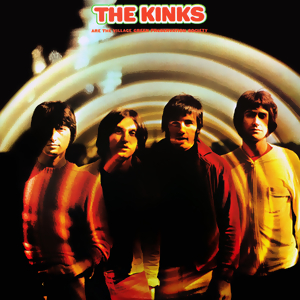
The Kinks Are the Village Green Preservation Society is the sixth studio album by the English rock band the Kinks. Released on 22 November 1968, Village Green is regarded by commentators as an early concept album. A modest seller on release, it was the band's first studio album which failed to chart in either the United Kingdom or United States, but was lauded by contemporary critics for its songwriting. It was embraced by America's new underground rock press, completing the Kinks' transformation from mid-1960s pop hitmakers to critically favoured cult band.
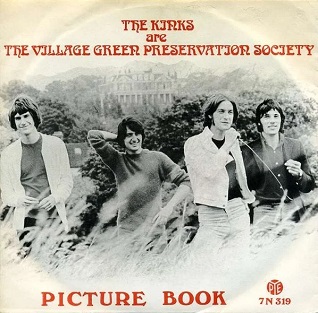
"The Village Green Preservation Society" is a song by the English rock band the Kinks from their 1968 album The Kinks Are the Village Green Preservation Society. Written and sung by the band's principal songwriter Ray Davies, the song is a nostalgic reflection where the band state their intention to "preserve" British things for posterity. As the opening track, the song introduces many of the LP's themes, and Ray subsequently described it as the album's "national anthem".

The Kinks were an English rock band formed in London in 1963 by brothers Ray and Dave Davies. They are regarded as one of the most influential rock bands of the 1960s. The band emerged during the height of British rhythm and blues and Merseybeat, and were briefly part of the British Invasion of the United States until their touring ban in 1965. Their third single, the Ray Davies-penned "You Really Got Me", became an international hit, topping the charts in the United Kingdom and reaching the top 10 in the United States.

Four More Respected Gentlemen is an unreleased album by the English rock band the Kinks. The project arose out of the band's different American contract schedule, which obligated them to submit a new LP to Reprise Records in June 1968. As the band continued recording their next album, released later in the year as The Kinks Are the Village Green Preservation Society, bandleader Ray Davies submitted fifteen completed master tapes to Reprise. The label planned to issue the LP in the US in November 1968 but abandoned the project only a month beforehand for unclear reasons.
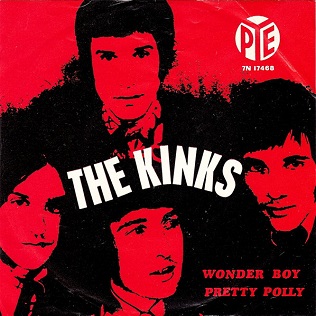
"Wonderboy" is a song by the English rock band the Kinks, written by Ray Davies. It was released as a non-album single in April 1968. It stalled at number 36 in the UK charts, becoming the band's first single not to make the UK Top Twenty since their early covers.

"Picture Book" is a song by the English rock band the Kinks from their 1968 album The Kinks Are the Village Green Preservation Society. Written and sung by Ray Davies, the song's lyrics describe the experience of an ageing narrator flipping through a photo album reflecting on happy memories from "a long time ago". Recorded in May 1968, its cheerful sound is defined by the jangle of an acoustic twelve-string guitar and a disengaged snare drum. In continental Europe, the song was issued as the B-side of the album's lead single, "Starstruck", in November 1968. The same single was issued in the United States in January 1969, though it failed to appear in any charts.
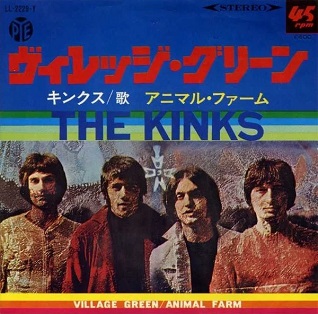
"Village Green" is a song by the English rock band the Kinks from their 1968 album The Kinks Are the Village Green Preservation Society. Written and sung by the band's principal songwriter, Ray Davies, the song was first recorded in November 1966 during the sessions for Something Else by the Kinks (1967) but was re-recorded in February 1967. Both the composition and instrumentation of "Village Green" evoke Baroque music, especially its prominently featured harpsichord played by the session keyboardist Nicky Hopkins. Unlike most of the band's late 1960s recordings, it employs real orchestral instruments, including oboe, cello, viola and piccolo, as arranged by the English composer David Whitaker.

"Polly" is a song by the English rock band the Kinks. It was released on a non-album single in April 1968, as the B-side to "Wonderboy". Written and sung by bandleader Ray Davies, the song was recorded in March 1968 during sessions for the band's 1968 album The Kinks Are the Village Green Preservation Society. Ray was initially inspired by the character Polly Garter in Dylan Thomas's 1954 radio drama Under Milk Wood, though his resulting character does not share anything with Thomas's besides the same name. The song is one of the few Kinks recordings from the late 1960s to possibly feature real strings, as arranged by David Whitaker.
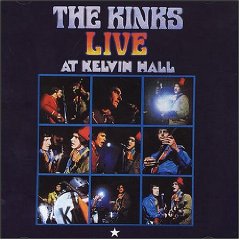
Live at Kelvin Hall is a live album by the English rock group the Kinks. It was recorded at Kelvin Hall in Glasgow, Scotland, in early 1967 and released in August 1967 in the US, and January 1968 in the UK. Live at Kelvin Hall received mixed reviews upon release, and sold poorly.

"Starstruck" is a song by the English rock band the Kinks from their 1968 album The Kinks Are the Village Green Preservation Society. Written and sung by Ray Davies, the song was recorded in July 1968. The song was issued as the album's lead single in continental Europe in November 1968 and in the United States in January 1969. The European release was accompanied by a promo film shot in Waterlow Park, Highgate. The song failed to chart anywhere besides the Netherlands, where it reached No. 13 on the Veronica Top 40 and No. 9 on the Hilversum 3 Top 30.

"Do You Remember Walter?" is a song by the English rock band the Kinks from their sixth studio album, The Kinks Are the Village Green Preservation Society (1968). Written and sung by Ray Davies, the song was recorded in July 1968. The song's narrator describes an experience of running into old friend, only to find that the two no longer have anything to talk about. The song was directly inspired by a similar experience of Davies. As one of several character studies to appear on Village Green, the song is often characterised by commentators as central to the album's themes of nostalgia and loss. Retrospective commentators have described it as one of Davies's best compositions.
"Animal Farm" is a song by the English rock band the Kinks from their sixth studio album, The Kinks Are the Village Green Preservation Society (1968). Written and sung by Ray Davies, the song was recorded in March 1968. Musically an example of pop, the song features a noticeably larger sound than the others on Village Green, accomplished through it being recorded in a larger studio space as well as heavy reverb added to its drums, percussion and tack piano. The song is one of the few Kinks recordings from the late 1960s to possibly feature real strings, as arranged by David Whitaker.
"Last of the Steam-Powered Trains" is a song by the English rock band the Kinks from their 1968 album The Kinks Are the Village Green Preservation Society. Written and sung by Ray Davies, the song was recorded in October 1968 and was among the final tracks completed for the album. Variously described as a blues, R&B or rock number, the song describes a steam train that has outlived its usefulness and has since moved to a museum.
"People Take Pictures of Each Other" is a song by the English rock band the Kinks from their sixth studio album, The Kinks Are the Village Green Preservation Society (1968). Written and sung by Ray Davies, the song was recorded in July 1968. The song features a breathless vocal from Davies as well as harpsichord and piano from Nicky Hopkins, which was likely the last contribution he ever made to a Kinks recording.

"Berkeley Mews" is a song by the English rock band the Kinks. It was released on a non-album single in June 1970, as the B-side to "Lola". Written and sung by bandleader Ray Davies, the song was recorded in early 1968 during the sessions for The Kinks Are the Village Green Preservation Society (1968). The title references a small street in London, while the lyrics recount a one-night stand. Influenced by the music of the 1940s, the song employs a heavier production than was typical for the band's 1968 work.
"All of My Friends Were There" is a song by the English rock band the Kinks from their sixth studio album, The Kinks Are the Village Green Preservation Society (1968). Written and sung by Ray Davies, the song was recorded in July or October 1968. It features a church-like organ and a changing metre, while the style showcased Davies's continued interest in music hall. The song's narrator describes an embarrassing concert experience which all of his friends were present to witness. Its lyrics were inspired by a July 1967 concert during which Davies fell ill but was persuaded to perform due to the agreed contract. The song was not present on Davies's original twelve-track edition of Village Green, but was among the tracks he added for its UK release in November 1968. Retrospective commentators have described the song in favourable terms while disputing its level of thematic cohesion with the others on Village Green.
"Monica" is a song by the English rock band the Kinks from their sixth studio album, The Kinks Are the Village Green Preservation Society (1968). Written and sung by Ray Davies, the song was recorded sometime between late 1967 and May 1968. The song features congas and a syncopated rhythm, indicating Davies's continued interest in calypso music. Its lyrics are a serenade for a prostitute and were partly inspired by Dylan Thomas's radio drama, Under Milk Wood (1954), though Davies kept the lyrics deliberately subtle to avoid a radio ban. Retrospective commentators have disputed the song's level of thematic cohesion with the others on Village Green.
"Phenomenal Cat" is a song by the English rock band the Kinks from their sixth studio album, The Kinks Are the Village Green Preservation Society (1968). Written and produced by Ray Davies, the song was recorded sometime between late 1967 and May 1968. The song features a Mellotron which duplicates the sound of a flute. It is one of several character studies on Village Green, recounting the story of a flying cat who travels the world, discovers "the secret of life" and spends the rest of his life eating. Commentators have sometimes likened the song to Victorian fairy tales and have often described it as an example of psychedelia.
"Sitting by the Riverside" is a song by the English rock band the Kinks from their sixth studio album, The Kinks Are the Village Green Preservation Society (1968). Written and sung by Ray Davies, it was recorded in July 1968. The song features honky-tonk piano and a Mellotron which duplicates the sound of an accordion. An example of psychedelia, the song's relaxed style is offset by the sound of a swelling cacophony between verses, a sound reminiscent of the crescendo in the Beatles' 1967 song "A Day in the Life". The song describes a pleasant experience sitting next to a river and was inspired by Davies's time spent as a child fishing with his father.













